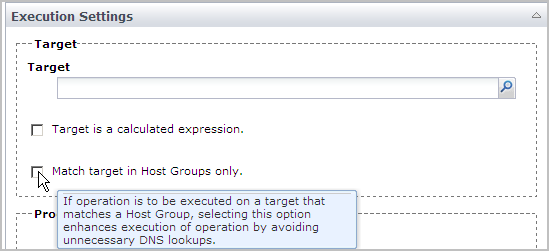

This topic, which is relevant to content designers, is for administrator information.
During process design, content designers specify execution settings for each operator. The following example shows a partial dialog with the Target field and the Match target in Host Groups only check box.

When the Target field contains a touchpoint name, a proxy touchpoint name, or an agent ID, clear the Match target in Host Groups only check box.
When the Target field contains an IP address of a specific host, select the Match target in Host Groups only. Specifying an IP address or a host name in the Target field is valid only if a host group in the current environment references the corresponding host.
Important! If a process is destined for export in a folder as a content package, do not enter an IP address in the Target field. Rather, enter a dataset name that contains the IP address. Also:
To understand the purpose of this check box, consider the case where:
The runtime processing evaluates and processes the Target entry in the following sequence:
Note: The operator fails if you select the Match target in Host Groups only check box when the specified target is not part of a host group. The operator fails even if the target is a valid touchpoint name, proxy touchpoint name, or agent ID.
|
Copyright © 2014 CA.
All rights reserved.
|
|